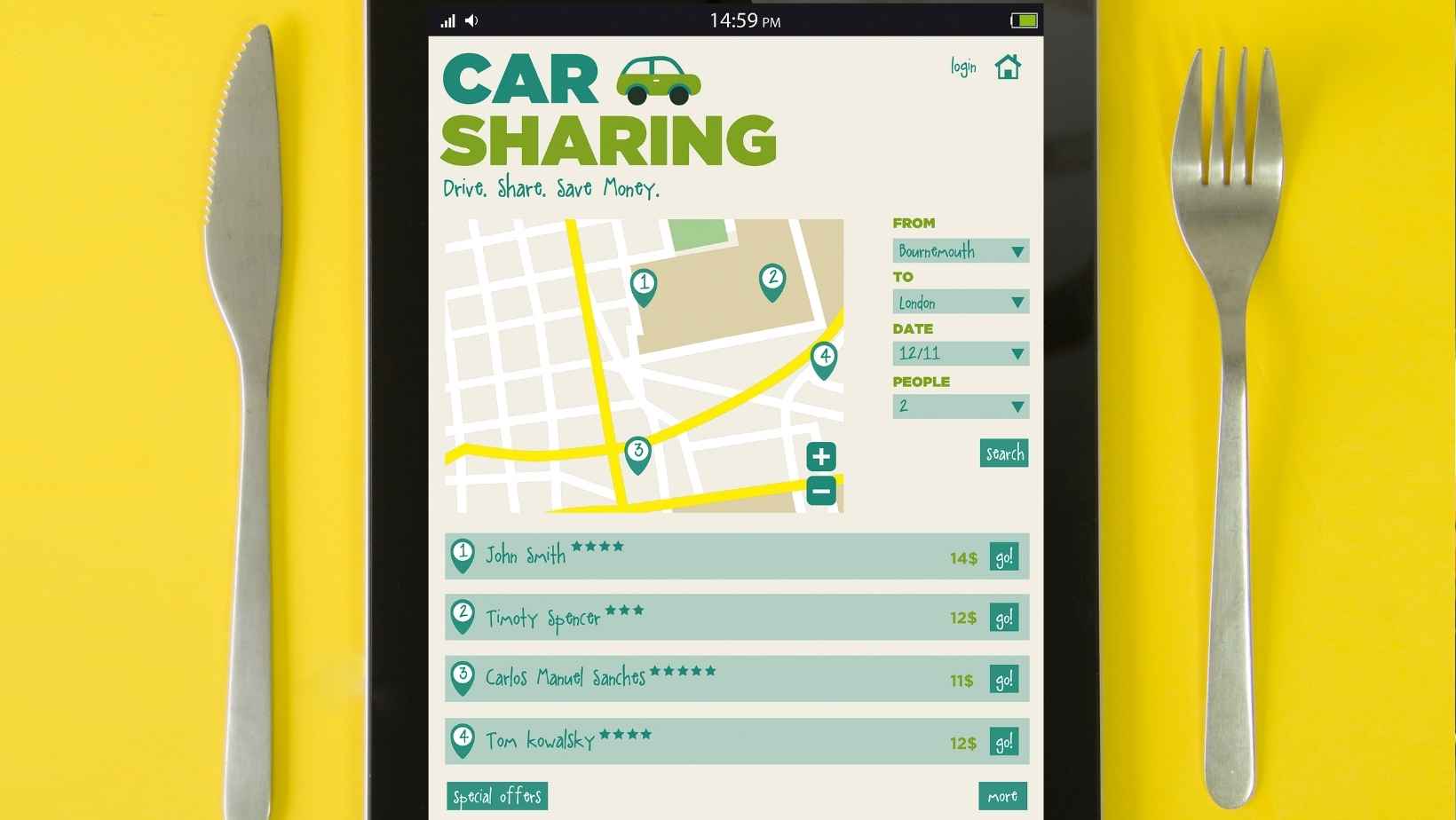Car sharing Industry (2024) — Everything you should know
Car sharing is a way for people to use cars without needing to own one. Instead of buying a car, people can borrow one for a short time when they need it. It’s like renting a car, but usually for just a few hours or days.
Car sharing has been around for a while now, but it’s become more popular in recent years as people look for alternatives to owning a car. It’s part of a bigger trend where people are sharing things like houses, bikes, and even clothes to save money and help the environment.
So, in this article, we’ll take a closer look at what car sharing is all about and how it’s changed over time. Ready to learn more? Let’s dive in!
Current Landscape of Car Sharing
The car-sharing landscape in 2024 is thriving with established players and exciting new developments.
- Major Players: Industry leaders include established companies like Ola, Uber, Zipcar, and Turo, alongside newer entrants like Didi Chuxing (China) and Renault Mobility (Europe).
- Geographical Reach: Car-sharing services are now available in major cities around the world, with a growing presence in suburban areas.
- New Features: Integration with public transport apps allows seamless multi-modal journeys, while electric vehicle options are becoming increasingly popular to cater to sustainability-conscious users.
Market Trends and Growth:
The car-sharing market is experiencing significant growth, driven by several factors. According to a recent study by [statista.com], the global market is expected to reach a value of US$16.43bn in 2028. This growth is fueled by:
- Rising car ownership costs: Owning a car is becoming increasingly expensive due to factors like rising fuel prices and insurance costs.
- Environmental concerns: Consumers are opting for more sustainable transportation options, and car sharing reduces car dependency and overall emissions.
- Urbanization: Densely populated cities benefit from car sharing as it reduces traffic congestion and parking problems.
By addressing these demands, car-sharing services are becoming a mainstream transportation option.
Advantages of Car Sharing
Advantages of Car Sharing
Car sharing has become increasingly popular due to several advantages it offers:
- Cost Savings: Car sharing can be more economical than owning a car, especially for those who don’t need a vehicle every day. Instead of bearing the expenses of purchasing a car, insurance, maintenance, and parking fees, users only pay for the time they actually use the vehicle.
- Environmental Benefits: By reducing the number of cars on the road, car sharing helps decrease traffic congestion and lower greenhouse gas emissions. Many car sharing services also offer electric or hybrid vehicles, which further contribute to environmental sustainability by reducing air pollution.
- Convenience and Flexibility: Car sharing provides users with convenient access to vehicles when needed, without the responsibilities of ownership. With the availability of mobile apps, users can easily locate nearby cars, make reservations, and unlock vehicles using their smartphones. This flexibility allows for spontaneous trips and eliminates the hassle of car maintenance, parking, and fueling.
- Reduced Parking Demand: Car sharing can alleviate parking shortages in urban areas by reducing the need for private vehicle ownership. As fewer cars are parked for extended periods, more parking spaces become available for other uses or to accommodate increased urbanization.
- Promotes Sustainable Transportation: Car sharing encourages the use of alternative modes of transportation such as walking, cycling, and public transit for everyday commuting, thereby promoting a more sustainable and multimodal transportation system.
- Community Building: Car sharing fosters a sense of community by encouraging collaboration and resource sharing among individuals. It promotes social interactions and reduces social isolation by providing opportunities for carpooling and shared trips.
Overall, car sharing offers numerous benefits, including cost savings, environmental sustainability, convenience, and community engagement, making it an appealing transportation option for many individuals and communities.
Challenges and Considerations
While car sharing offers various benefits, there are also challenges and considerations to be mindful of:
- Regulatory Issues: Car-sharing services often face regulatory challenges related to zoning, insurance, liability, and taxation. Local governments may impose restrictions or require permits for car-sharing operations, which can vary depending on the region.
- Security and Safety Concerns: Ensuring the safety and security of vehicles and users is paramount for car-sharing companies. Challenges such as vehicle damage, theft, and accidents may arise, necessitating robust security measures and insurance coverage.
- Infrastructure and Technological Challenges: The success of car sharing relies heavily on efficient infrastructure and reliable technology. Maintaining a fleet of vehicles, establishing pickup/drop-off locations, and implementing user-friendly mobile apps require significant investment and ongoing maintenance.
- User Behavior and Trust: Car sharing depends on users’ trust and responsible behavior. Issues such as vehicle cleanliness, timely return of vehicles, and adherence to traffic regulations can impact the overall experience for both users and service providers.
- Competition and Market Saturation: The car sharing market is becoming increasingly competitive, with numerous providers vying for market share. Sustaining profitability and differentiation amidst competition can be challenging, particularly in densely populated urban areas.
- Dependency on External Factors: External factors such as fuel prices, technological advancements, and shifts in consumer preferences can influence the viability and growth of car sharing services. Adapting to changing market dynamics and emerging trends is essential for long-term success.
- Social Equity and Accessibility: Ensuring equitable access to car sharing services for all members of society, including low-income individuals and underserved communities, is crucial. Addressing barriers such as affordability, geographic accessibility, and digital literacy is essential to promote inclusivity and social equity.
Navigating these challenges requires collaboration between car sharing providers, policymakers, regulatory agencies, and community stakeholders. By addressing these considerations proactively, the car sharing industry can continue to evolve and contribute positively to sustainable urban mobility.
Types of Car-Sharing Models
| Car-Sharing Model | Description |
| Station-Based Car Sharing | In station-based car sharing, vehicles are parked at designated stations or hubs located throughout a city or urban area. Users typically reserve a vehicle in advance and pick it up from a specific station, returning it to the same location after use. This model offers predictability and consistency in vehicle availability and parking. |
| Free-Floating Car Sharing | Free-floating car sharing allows users to locate, unlock, and access vehicles parked within a defined service area using a mobile app. Unlike station-based models, users can pick up and drop off vehicles at any designated parking spot within the service area, providing greater flexibility and spontaneity in trip planning. |
| Peer-to-Peer Car Sharing | Peer-to-peer car sharing enables individuals to rent out their personal vehicles to others when not in use. Owners list their cars on a peer-to-peer car sharing platform, and renters can browse available vehicles, make reservations, and arrange pickup and drop-off locations directly with the owner. This model promotes resource sharing and utilizes existing private vehicle fleets. |
Future Outlook
The future of car sharing is poised for continued growth and evolution, driven by technological advancements, shifting consumer preferences, and a growing emphasis on sustainability. Emerging trends such as autonomous vehicles, electrification, and shared mobility platforms are expected to reshape the car sharing landscape in the coming years.
- Autonomous Vehicles: The development and integration of autonomous vehicle technology hold the potential to revolutionize car sharing by enabling on-demand, driverless transportation services. This could enhance efficiency, reduce costs, and improve accessibility for users, further blurring the lines between traditional car ownership and shared mobility.
- Electrification and Sustainability: The transition towards electric and zero-emission vehicles is gaining momentum, driven by environmental concerns and regulatory mandates. Car sharing companies are increasingly incorporating electric vehicles (EVs) into their fleets, offering users cleaner and greener transportation options while contributing to efforts to combat climate change.
- Integration with Public Transit: Collaboration between car sharing providers and public transit agencies is becoming more common, facilitating seamless multimodal transportation solutions for users. Integrated mobility platforms and fare structures enable commuters to combine car sharing with other modes of transit, promoting efficiency and reducing congestion in urban areas.
- Data-Driven Solutions: Leveraging data analytics and artificial intelligence, car sharing companies are enhancing operational efficiency, optimizing fleet management, and personalizing user experiences. Predictive algorithms and smart routing algorithms enable dynamic pricing, demand forecasting, and real-time vehicle allocation, improving service reliability and customer satisfaction.
Conclusion
As we look ahead, the future of car sharing holds promise as a sustainable and accessible transportation solution for urban communities worldwide. By embracing innovation, collaboration, and a commitment to meeting the evolving needs of users, the car-sharing industry is well-positioned to play a vital role in shaping the future of urban mobility.
Whether it’s reducing congestion, lowering emissions, or enhancing convenience, car sharing continues to drive positive change towards a more connected, efficient, and sustainable transportation ecosystem.
How much did you like Our detailed Car Sharing Industry Trends 2024? Review Also, please share these Blogs with your friends on social media.
Recommended
































